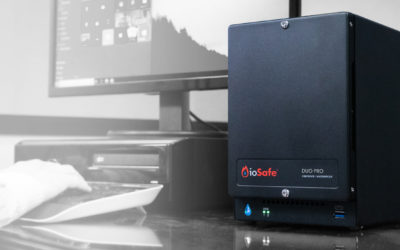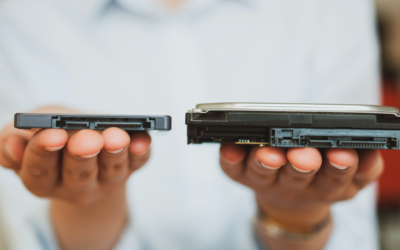Do I Need a NAS at Home?
After working from home for the past seven months, many of us have started reevaluating what data storage needs we have at home — including NAS devices. However, there are so many different types of data storage that it becomes difficult to sift through the noise and select a device that meets your needs. Often times, people just go to the local electronics store and purchase the cheapest USB device.
But, if your entire family is now at home and utilizing data storage, there are better ways to store and protect your data. Today, we will explore the question of whether a NAS device is necessary at home.
What is a NAS device and how’s it different from an external hard drive?
First off, a network-attached storage (NAS) device operates on its own with its own operating system. These devices essentially have a small computer in them that makes storage smarter. These mini-computers add more functionality to your device.
Your typical external hard drive only has a USB plug to attach to one computer aka direct-attached storage (DAS). For instance, if I were to use a DAS device to my own computer via USB, my family would not be able to access that data. Nor would my family be able to utilize that storage device’s full potential because it is attached to one computer only. To that end, I think about media storage and use cases such as a Plex server for hosting Movies/TV shows and photos, which more or less require a NAS device.
A NAS device would allow multiple people to access that storage data at the same time because the device’s functionality is greater than that of an external hard drive. The benefits of this would be syncing your data regardless of location so everyone is able to access the data simultaneously.
So, Susie can watch her downloaded TV shows while Timmy does photo editing while you are saving work documents to the NAS device and your significant other is attaching photos from the last family vacation.
Is a NAS device at home necessary?
In most cases, yes! It really depends on the type of uses, the number of people, if there are external people that want access to that data as well, and your risk tolerance for data destruction.
If you are only using one device per person, I think an external hard drive is okay. However, in today’s multi-device per person environment, a NAS device is ABSOLUTELY A MUST! It protects your data and syncs your data from your devices so you have a copy.
NAS devices often have redundancy and allows for a second copy of your data to be made in case a hard disk fails – something that does not happen with single drive external hard drives.
A disaster-proof NAS is even better. With fires and floods becoming more disastrous and frequent, a device that can withstand disasters when you aren’t home is vital.
Originally published Nov 19 2020, updated Nov 19 2020

Benny Kuo
Product Marketing Manager
Among wearing many hats in the ioSafe Marketing team, Benny often engages in tradeshows, customer interviews, and competitive analysis. In his spare time, he enjoys repairing computers — saving them from the e-waste stream.
Related Blog Posts
Introducing the ioSafe Duo Pro
Today we're excited to announce the ioSafe Duo Pro. The Duo Pro is our most reliable direct-attach storage (DAS) fireproof...
HDD or SSD: Which is Better for Backup?
Without a doubt, the two storage technologies that dominate the market today are hard disk drives (HDDs) and solid-state...
How Often Should You Back Up Your Data?
Working for a company with “Data Security” in the name, I spend a lot of my day thinking about backups and data. What...



